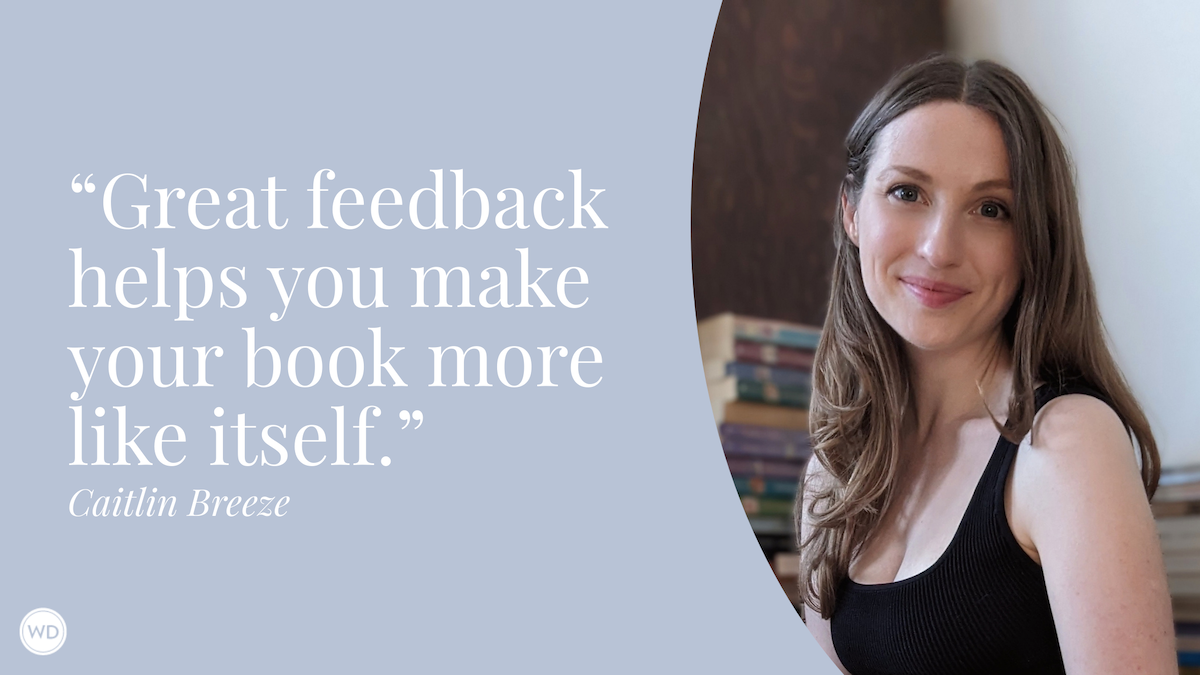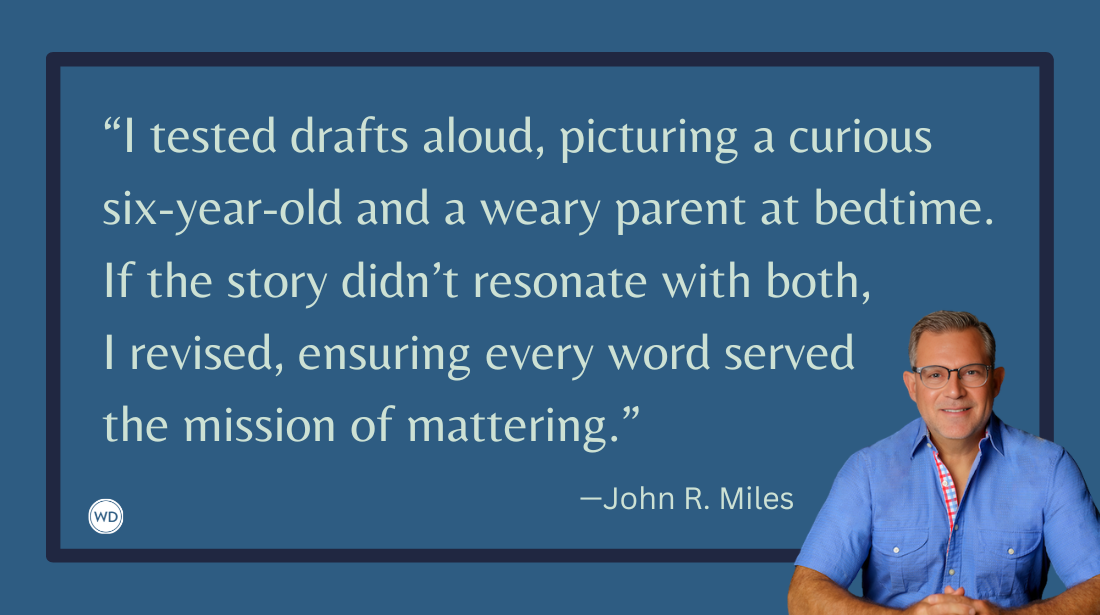Making It Past the First Round
Ran Walker, a WD writing competition judge, offers advice for entrants to make the most of their writing competition submissions.
[This article first appeared in the Jan/Feb 2023 issue of Writer's Digest.]
In 2018, after years of submitting to different competitions, something miraculous happened: I won a regional literary award. Shortly after that, I went on to win two back-to-back national awards. In my opinion, nothing had changed about my approach to writing and submitting my work, so this was simply luck, in the purest sense.
Afterward, I was invited to participate as a judge for local, national, and regional competitions, and that’s when I dawned on me that there were some pretty clear differences between works that were sure to make it to the next round of a competition versus those that wouldn’t. I had stumbled onto the former in 2018 by chance when I had my breakthroughs, but I now realize that writers shouldn’t have to stumble onto anything and that there are certain things all writers should be aware of before submitting their work, to better their chances of making it into the next round and possibly winning a competition.
Admittedly, there are always some matters of subjectivity that will ultimately determine the outcome of any competition. You will have no way of knowing what a judge’s taste is or what their genre preference might be. Still, there are a number of things that you can do to better your chances, regardless of who might be evaluating your work.
While none of these are absolutely foolproof, these four categorical tips are enormously helpful nonetheless.
Tip 1: Master the opening of your story.
One of the things I have noticed about a number of stories I have evaluated is this: Many writers don’t know where to begin their stories. While I won’t say that you can’t do a first-person character introduction or begin with a piece of dialogue, I will share that many writers do this, and oftentimes, this is done unnecessarily as a way to build to something interesting happening. One way of combatting this might be to consider starting much closer to the inciting incident (or even after it). Much of what we consider the seasoning (or exposition) of the story can be sprinkled around as needed so that it does not slow down the plot of the story or serve as a massive block of information weighing down the beginning of the story.
While there is a need to get the attention of the judges at the beginning of the story, try to come about that through earnest, solid writing, as opposed to gimmicks, such as cursing in the first sentence or starting with onomatopoeia. Likewise, in trying to maintain the judges’ interest, keeping the early paragraphs shorter is more visually inviting than having the judges look at a dense wall of black text on the first page of the document. Ultimately, you should aim to gently pull them into the story, even in terms of balancing the look of the words on the page, while intriguing them enough to move from sentence to sentence, paragraph to paragraph, page to page. And I say this, not to be overly curt or mean, but if the judges can’t easily get into your story, they may be reluctant to continue reading it and move on to the next contestant.
One last thing about beginnings that I have found to be interesting is that many writers don’t have a solid sense of the “present” moment of the story. Unlike a TV episode that begins “Twenty-four hours earlier …” and then immediately flashbacks to an earlier moment in the plot, a story should begin in the present action, not live entirely within past moments that serve no actual purpose for what is going on in the present. An easy fix for this is to write the story so that what was originally in the past now becomes the present action of the story.
Tip 2: Master formatting and grammar.
Sometimes a contest will give you specific formatting instructions (that typically align with what are considered industry standards), and sometimes it won’t. Regardless, there are certain formatting expectations that judges will have when they approach your work. Typically, a story should be submitted using equal double-spacing throughout and a 12-point serif font (like Times New Roman, Courier New, Garamond, etc.). Ideally, 12-point Times New Roman should be your default (unless the contest prefers the more classic style of Courier New). The margins should be one inch all the way around. I didn’t create this format, but I recognize how useful it can be for writers in general. I have judged entries where the submissions were in Comic Sans or the author elected to insert photos into the document or create flourishes with drop caps and other stylistic alterations to the document. Fight the urge to do this. Where you want to be different is in the writing itself, not the formatting. If you deviate too far from the standard, the judges might not think you’re a serious writer.
Another thing that surprises some writers is that it is their responsibility to master the grammar they use. Please note here that I am not saying the writer has to master all grammar in the language, but they must master what they choose to use of it in their stories. There is no judge who is going to edit your work for you. It will need to be perfect when it is submitted. This means learning all of the rules about commas, semi-colons, colons, dialogue punctuation, subject-verb agreement, indefinite pronouns, collective nouns, dangling modifiers, misplaced modifiers, verb forms, unnecessary adverbs, proper spellings of words, and anything else you thought you had abandoned for good after you finished the 10th grade. With the level of competition that is out there, a grammatical mistake could very well be the deciding factor between a story that moves on to the next round versus one that is eliminated immediately. Perfecting this level of your craft lets the judges know that you are serious, not just about what you write, but how you present it, as well.
Now, with that said, as a writer, you do have the right to break grammatical rules from time to time. For example, breaking rules for the purpose of character dialogue is not a bad thing, nor is a well-placed conjunction appearing at the beginning of a sentence. These departures, when used sparingly, could very well be effective. The same goes for the occasional adverb or passively constructed sentence. The key is to do these things in moderation. If everything thing else is grammatically correct, the judge will likely recognize stylistic choices with little problem. Still, keep this notion in mind: It is best to know the rule before you break it, than to not know the rule at all.
Tip 3: Master the content of the story.
If you give different bakers the same ingredients and tell them to make cupcakes, each of those cupcakes will be different according to the manner and amounts in which the ingredients were combined, as well as the cooking time and temperature. Think about how you write your story as the manner in which you make your particular “world famous” cupcake. One of the things you’ll probably realize right out the gate is that you cannot use your ingredients recklessly. You will want to be discerning in how you construct your story, as well. One way of doing this is to treat words like money: don’t spend what you don’t have to spend. In short, avoid using unnecessary language and allow the action of the story to do the work of implication. Trust that the judges are smart enough so that you don’t have to include every single detail in your writing for them to understand it. Leave space for them to read between the lines. Those rhetorical questions that you have in italics that reveal the direct thoughts of your character? Yep, they probably don’t need to be there.
Also, avoid clichés where you can and unnecessary adverbs and adjectives unless you deem them absolutely necessary. You also don’t want to make assumptions about the judges’ likes and dislikes, i.e., all kittens aren’t necessarily cute and all readers don’t necessarily subscribe to your particular faith. Every sense of humor is different. This is not to tell you to not be yourself (I would never tell a writer to water down who they are), but it is to say that you have to write so that your story can be understood and appreciated by people who are not like you. This is more of a matter of the way in which subjects are written, as opposed the subjects themselves. Good writing will draw a judge who has never read fantasy fiction into the story to where they will savor every single word and feel compelled to finish it. That is what you want to aim for: mastery of your content so that you can present it at its most elite level.
Another tip about content, particularly as it applies to length, is to consider submitting a piece that falls short of the maximum word count. (If there is a minimum, please hit the minimum, though.) There have been competitions I have judged where the maximum word count was 1,500 words, and I can tell you with little hesitation that there is not really any such thing as a natural 1,500-word story. To reach that word count, you must do one of two things: edit it down to 1,500 words or build it up to 1,500 words. As a result, the story is not being presented at its natural length, and trust me when I say that the judge will be able to sense this. I have read plenty of stories that felt like they should have been longer and others that felt like they were filled with fluff to meet a word count that was simply there as a cut-off point. If a person submits a story that is 1,258 words, I can look at that and sense that the story is at the length it was designed to exist at, but a submission that is 1,500 words exactly when that is the maximum word count sends up a red flag that it might have been edited quite a bit to get it to that number. Sometimes this can work to your advantage, but it often doesn’t.
One final point I will make about content is that there should always be some hint of a conflict going on. Feel free to plant this seed as early as the first sentence, if you feel it will work. The way that you entice judges to stay with your story until the end (thereby giving you a much better shot at moving on to the next round) is to have nuggets of conflict that propel them from sentence to sentence, paragraph to paragraph, and yes, page to page. Write your story in such a way that the judge has to know what happens in the end before they move on to the next story. Write your story so that it is so interesting it can compete with Netflix, video games, social media, and other stories for the judges’ attention.
Tip 4: Understand how contests work.
If you understand how a particular contest works, it can help you to set a realistic frame for what will happen. For example, if there are 3,000 people submitting to a particular contest, understand what the odds are. This is by no means my attempt to dissuade you from submitting your work; in fact, it is the opposite. I want you to submit your absolute best work so that you can beat out 2,999 other people for that award you want.
To that end, you’ll want to make sure that you are fully invested in the process of participating in the contest. Don’t participate half-heartedly or use work that you have not yet edited or assume that there is a less talented writing pool participating in the contest. You should prepare for the competition assuming everyone else is taking the process just as seriously as you are.
The reality, though, is that more than half of the submissions will likely be taken out of contention for an award simply based on the aforementioned points listed in Tips 1–3. Not to overstate this point, but many stories will have trouble getting judges to commit beyond the first paragraph. Things like sans serif fonts, large fonts, inserted images of rainbows or dragons, or un-indented paragraphs can get a story excluded faster than the time it took you to read this sentence.
Another important thing to understand is that judges are not conspiring against you. They are simply performing a job, one that normally requires a great deal of time, skill, and effort so that a person they don’t know is able to achieve something spectacular. As such, they will bring their own perspectives to how they perceive your work, which is to say that sometimes, regardless of what you may or may not have done, your work might be excluded by a judge based on criteria that may not be readily quantifiable. For example, if the judge has been given instructions to select the top 10 stories out of a submission pool of 1,000, the judge will be using an incredibly rigorous rubric because the aim is not to promote stories to the next round, but instead, it is to eliminate stories until only 10 remain. That might sound a lot like Suzanne Collins’ Hunger Games, but keep this in mind: To be the last one standing, you have to have been strategic about getting there.
It is, therefore, helpful for you to ask yourself why you want to participate in this competition or even if you feel that you are ready to compete yet. The talent pool could consist of MFA students (or graduates), people who’ve been writing for decades with writing groups, people who have published in multiple places, people with any manner of job but with a freakishly gifted approach to writing, and people who may be transferring from screenwriting or poetry or some other artistic discipline. Only the judges will see the quality of the work that is submitted, and while you have no control over what others do, you have complete control over what you do.
Conclusion
Mastering the opening of your story, mastering the grammar and formatting of your story, mastering the overall content of your story, and understanding the general realities of how writing contests work can give you most, if not all, of the ammunition you need to give yourself the best odds of making it to the next round—and, if all goes well, to the end of the competition.
So, as you continue to hone that story you’d like to submit, consider this: You don’t have to be a master of your genre or even the short story in general, but you should strive to be a master of your particular story. Only when you’ve put out the best story that you can possibly write will you be able to say that you’ve given it all that you have, and, truthfully, that’s really all anyone could ever ask of you.
Ran Walker (he/him) is the author of 25 books. His short stories, flash fiction, microfiction, and poetry have appeared in a variety of anthologies and journals. He is the winner of the Indie Author Project's 2019 National Indie Author of the Year Award (selected by judges from Library Journal, Publishers Weekly, IngramSpark, St. Martin's Press, and Writer's Digest), the 2019 Black Caucus of the American Library Association Best Fiction Ebook Award, the 2018 Virginia Indie Author Project Award for Adult Fiction, and the 2021 Blind Corner Afrofuturism Microfiction Contest. Ran is an Assistant Professor of English and Creative Writing at Hampton University and teaches with Writer's Digest University. He also contributes to Writer's Digest magazine. He lives in Virginia with his wife and daughter.








